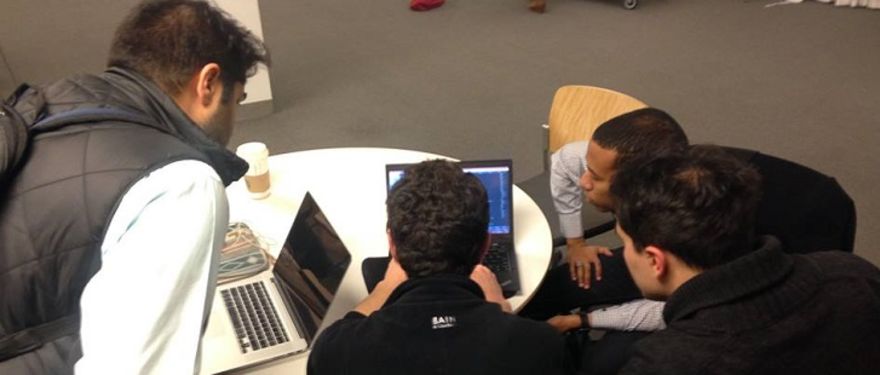These days more and more MBA students are choosing to pursue a career in tech. At HBS, 20% of the Class of 2015 went into the tech industry after graduation and the Code Club is an active student group on campus. For many, having some basic coding knowledge is a must.
During their second year at HBS, students can choose from close to 100 electives. They also have the opportunity to cross register for courses across Harvard. CS50—a course offered at Harvard College—provides students with an introduction to programming. Last year 94 MBA students opted to take the course.
We connected with two recent graduates who took CS50 to learn what the class is all about. Samuel Gooch (MBA 2015) worked in renewable energy consulting before HBS and is now an engineering program manager at Apple. Sloan Holzman (MBA 2015) formerly worked at a social enterprise start-up in East Africa and is now a consultant at Boston Consulting Group.
Why did you want to take CS50?
Samuel: I wanted to learn the language of computer science, so I actually knew what software engineers were talking about.
Sloan: I took CS50 because I've always had an interest in coding, but it is hard to learn on your own. The entire CS50 class is built around lengthy coding assignments each week. These assignments were the crux of the course and the highlight. You can't learn to code without solving real problems.
How is CS50 different from your typical classes?
Samuel: It’s a LOT more technical than your average HBS class. So, there are actually right and wrong answers. ;)
Sloan: It was different in a lot of ways:
- Instead of class participation and finals, the class was built mostly around the problem sets and final project (plus a midterm and final). It was very practical learning, as opposed to theory and debate.
- Class is optional - I actually watched most of the lectures online.
- It's a lot of work! Probably 20-25 hours a week. It's much easier if you attend office hours and/or work with your peers.
- It's a lot of fun. After reading so many cases, it is great to try something different where you learn new practical skills.
What was the most challenging thing about this class?
Samuel: The class covers a ton of different areas, but not in much detail. If you had no background with coding (or just weren't very tech-savvy in general), it would be hard to stay afloat. It was hard even having some experience.
Sloan: Just the workload. It's hard to dedicate 20-25 hours a week.
What was the most rewarding thing about it?
Samuel: Building things! You build several apps/programs yourself in the course of the class. Also learning the "language" of CS. I wouldn't say I could go write an app on my own, but I have enough knowledge to know where/how to find those resources if I did want to.
Sloan: Finishing the problem set each week and creating the final project. It is really fun to get a problem set assignment, have no idea where to begin, and then after a day or two you have solved the problem and created something awesome out of scratch. You get to be creative and analytical at the same time. Plus, it's always fun to make something tangible.
How do you plan to use this skill set in the future?
Samuel: I now work with software engineers on a daily basis.
Sloan: I loved it so much that I am considering pursuing coding more seriously as a potential career. But, at the very least, if I ever start my own company, I'll have the skills to create the website. Also, learning SQL is very valuable in a lot of jobs (though, you can learn that on your own).
What advice would you give to prospective students interested in coding?
Samuel: Take CS50!! It’s taught by an amazing professor, and if you are even remotely considering the tech space this class will let you "talk the talk" and avoid the stereotype of the non-technical MBA "who wants to get into the tech space".
Sloan: I highly recommend the class. It was my favorite course. But, it's a lot of work, so only take it if you are willing to dedicate the time.

